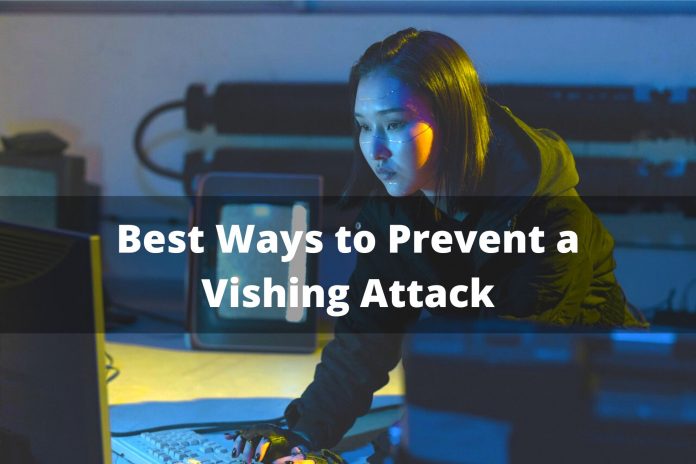In this article, we’ll talk about Vishing Attacks and the Steps can you take to prevent a Vishing Attack.
The regularity of internet attacks is rising along with the world of technology. And a substantial percentage of us anyway have experienced similar attacks.
So, the question that comes here is what steps can you take to prevent a vishing attack?
And, guess what! You asked for it, and we delivered…
Since it’s Selfoy tradition to begin with the definition and meaning of the issue at hand, we’ll fall into line today and commence with the definition of the Vishing attack.
What is Vishing Attack
Vishing, a specialised kind of phishing attack, targets victims over the phone. Vishing attempts to deceive victims into sharing personal information like passwords or credit card information. This is identical to typical phishing attacks.
They could pretend to be Bank employees or Representatives of another company in order to get sensitive data or trick victims into unknowingly downloading Malware onto their systems.
Robocalling technology is another tool that Vishers can use to automate their attacks.
Some common examples of Vishing Attacks are:
- Bank impersonation fraud
- Telemarketing scams
- Impersonating Government Officials
- Bank account theft
- Endangering Law Enforcement and
- Attacks Via Technology Support are just a few examples.
Some common Techniques of Vishing Attacks are:
- Wardialing
- Caller ID forgery
- VoIP
- Diving into trash
The most popular technique used by threat actors to gather private information or obtain access to networks and systems is Social Engineering.
Voice phishing (Vishing), in accordance with some security experts, has a success rate of 37%, but this rises to 75% when paired with email phishing.
It is challenging to undo the consequences of a vishing assault and repair the harm once a victim.
Even if Law enforcement locates the offender, it might be difficult to obtain compensation in lieu of damages.
Thus, it is imperative to take early steps to prevent Vishing Attacks by adhering to the following best practises:
What Steps Can You Take To Prevent A Vishing Attack? (8 best ways)

-
Administer anti-social engineering training, then take it
The best defence against social engineering-related cybersecurity attacks is frequently knowledge and awareness.
You may learn from other people’s experiences of how fraudsters affected them or how they responded to the situation by conducting proactive research on Vishing instances.
It will help you determine the number of affected people and the severity of the harm.
As part of their internal cybersecurity awareness effort, organisations should also provide training. Users should be mindful of the psychological weaknesses an attacker can exploit and refrain from participating in such talks.
Businesses may mimic Vishing calls in a secure setting to instruct staff on the best course of action.
-
Register with the “Do Not Call” directory
This is an easy way to stop spammers from calling you. Callers no longer have to dodge telemarketers one by one thanks to the creation of the National Do Not Call Registry in the U.S.A (or its equivalent in your area).
Instead, they can build a broad blacklist that would stop any calls and messages that have not been registered.
The user will however continue to get calls from the businesses they often do business with. So, one wouldn’t be entirely protected if a scammer pretended to be such a company.
Thus, this recommended procedure is only a initial layer of security against vishing attacks.
-
Check the time of day the call was made
Scammers frequently portray a business that the victim is acquainted with, but they may be operating from a different time zone or may not be aware of the business’s operating hours.
Remember that a company will only contact you during business hours if they are calling you truly.
To strengthen the relationship, they may also provide a call transcript or a follow-up feedback survey.
Vishing attacks can be avoided by noticing the warning flags of calls made at odd hours and without any genuine context.
Additionally, a firm or the IT staff at your place of Business will never request access to your computer over the phone.
-
Monitor for ‘urgent’ calls and messages
When a caller conveys a sense of urgency, it should be taken seriously always no matter what the situation is.
Vishing attackers could try to persuade the victim, for instance, that there would be bad repercussions if they do not actually provide banking information or instantly pay a debt that is past due.
Another typical trick is when a caller alleges that a person’s computer has a virus on it or that it is infecting other computers on the company network.
You can either hang up the phone or get the caller’s contact information and say you’ll call them back later. The caller will often exert more pressure or hang up if it is a scam.
-
Use Robocall Blocking Software
Robocall blocking software, sometimes referred to as call filters, is used to identify automated calls.
The robocall filter will instantly recognise and block any third-party company that has used Wardialing methods.
Robocall blockers are a feature that many Telecom providers include in their value offering.
Given that Robocall blockers may gather information, it is best to use a paid service, and one should only go with reputable tool providers.
For instance, CallApp. Free, $1.99 per month, or $10.99 annually.
-
Benefits from a VPN connection
With the help of a Virtual Private Network (VPN), you can secure online communications and make it more difficult for the scammers to obtain your contact information.
Before reaching a VPN server that hides your IP address, the VPN will encrypt network communication and transfer it over a secure tunnel.
Threat actors won’t be able to carry out Social Engineering Attacks since they won’t be aware of your Location in particular.
Simply asking the caller about their location will allow the intended victim to verify whether the call is authentic or not .
Read Related: What is a vpn and what does it do ?
-
As a guideline, keep dodging unknown phone numbers
When contacting their victims, fraudsters don’t always use the same method. It might not always be easy to restrict phone numbers.
One must always be on guard in case someone calls your number from numerous different VoIP providers in an effort to steal your login information.
The simplest way to get out of predicaments like this is to never entertain unknown calls in the first place.
And in doing so, you may ensure your safety in any scenarios involving calls from unknown numbers.
If you notice an odd number, don’t pick up the phone or end the call. Ask the caller to confirm their identification by text or social media to use your two-factor Authentication system.
Additionally, IT personnel need to routinely check their company’s VoIP apps for unwelcome or illegal access and activities.
Checking and auditing authenticated user access logs and keeping an eye on call records for odd (like after-hours) activities are also recommended.
Any legitimate government person or organisation will never contact you in the early morning or late at night. Most businesses adhere by the regulations that calls may only be made during regular business hours.
If you don’t recognise the number, don’t answer the phone. Instead, leave a message on your voicemail and listen to it later to determine whether or not to return the call.
The scammer will make every effort to call you or appear urgent, but you do not need to be alarmed by such things and stay cautious.
Don’t panic and analyse the situation wisely. In fact, you may talk about these issues during family gatherings where other family members can also express their thoughts and get an understanding of them.
By doing this, you may also encourage them to talk about any instances in which something similar really occurs to one of them.
-
Zero-trust policy must be followed
Zero trust isn’t only a Cybersecurity solution that mandates least privilege access to Business data and Systems.
To ensure that teams and individuals confirm a person’s identification before exchanging information with them, it should be a driving element for corporate culture.
Organizations may do this by developing zero trust policy guides and guidelines that address phone interactions.
One of the first fraudster tactics, dating back to the pre-digital period, is phishing. With the spread of network-based communications and data, it is now simpler for attackers to imitate real calls.
Vishing may be avoided, nevertheless, by exercising caution in both one’s personal and professional life. Such assaults may be avoided by scrutinising every telephonic conversation and by never discussing any kind of sensitive information over the phone.
Now that you are aware of how to protect yourself from Vishing Attacks, it is crucial to know what to do next if you ever get attacked.
How Can You Revive from A Vishing Attack?
The vishing attack’s type and what was compromised will determine how well you can recover from it.
Notify your Security department right away if you are a remote teleworker who connects into a business environment using a device that was provided by your employer.
They will give you advice on what to do next and ask for a thorough account of your interactions with the attacker.
When corporate sensitive data is involved, there may be a specialist Incident Response team in most corporate contexts that will offer advice on the next stage in the procedure.
Make sure your anti-virus software is up to date and change your password if the attack happened on your personal computer.
If you unintentionally provided the attacker with your financial information, get advice on how to secure it from further misuse from the institution.
Contact the credit bureaus right away to freeze your credit or to ask for advice on how to recover if you believe your credit information has been stolen.
To conclude, the following Steps can be taken to protect against being the target of a Vishing Attack:
- Administer anti-social engineering training, then take it:
- Register with the “Do Not Call” directory
- Check the time of day the call was made
- Monitor for ‘urgent’ calls and messages
- Use Robocall Blocking Software
- Benefits from a VPN connection
- As a guideline, keep dodging unknown phone numbers
- Zero-trust policy must be followed
Establish strict security policies for wiring money or updating payment information, such as requiring offline confirmation before sending money requests. Conduct regular vishing exercises.
Follow-up with security awareness training for staff. Enrol in an Identity Theft Protection membership. Don’t pick up the phone. Hang up right away if the caller sounds suspicious.
Being wary of any phone call when the caller requests that you provide them important information, such as your identity, is the most effective approach to defend yourself against fraudsters.
Ask the caller for their name, business, and contact details if you are doubtful of the validity of the call. When you have this information, end the conversation and give the business a call back at a number you are confident is real.
By doing so, you would be able to determine whether the call was genuine and, if not, take the necessary steps.
Read Related: How To Identify a Vishing Attack & Safeguard Against it? (2024)
Conclusion
Vishing attacks, like phishing attempts, will persist as long as there is a chance of breach and the cybercriminal is motivated by money.
Thus, we have discussed in detail about what steps can you take to prevent a vishing attack?
Understanding the attacker and the type of attack is the ideal attack for a criminal looking to exploit sensitive information that belongs to you or your business.
And Human awareness is one of the primary lines of defence against phishing assaults. Vishing and social engineering assaults may be very predictable, therefore knowing the tell-tale indications of these attacks can help you safeguard your privacy and the reputation of your business.
Always be on the lookout for ways to secure both your employer’s and personal information. You will be able to identify and avoid being the next vishing attack victim by adhering to the straightforward safety measures and suggestions suggested in this article.







